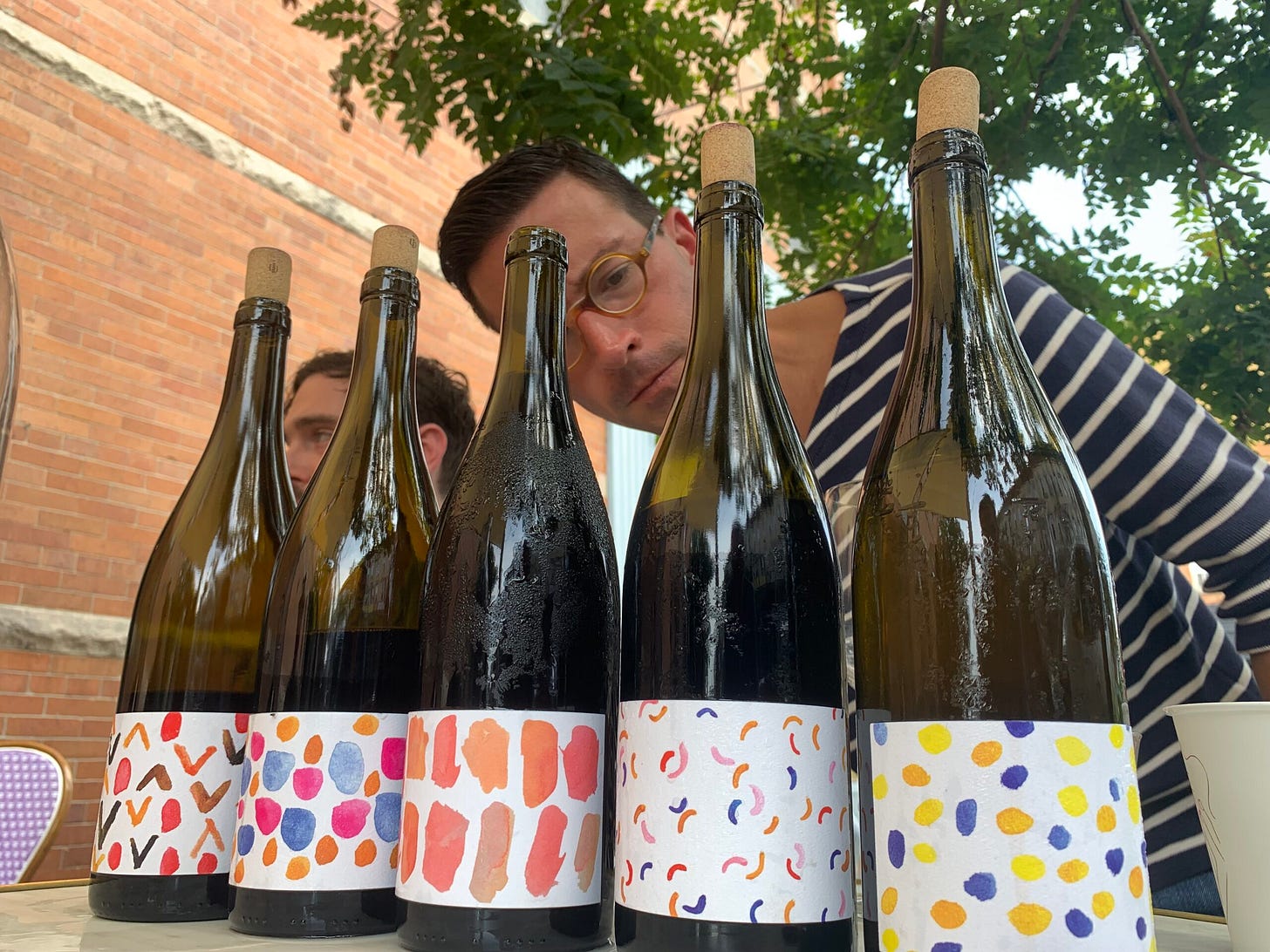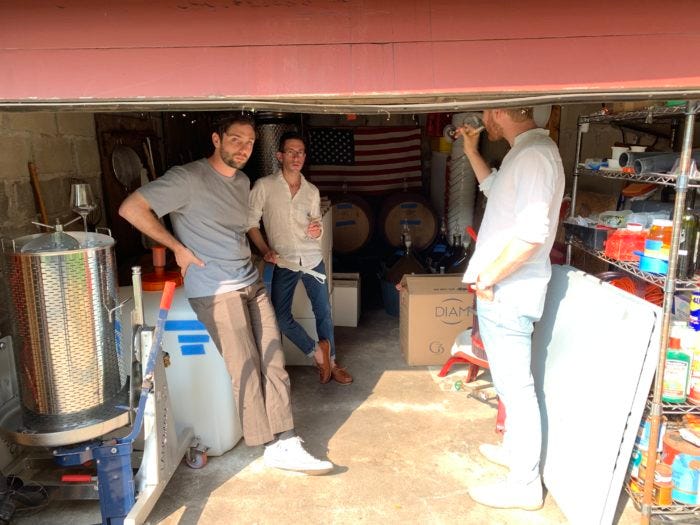If you want to know why I wanted to get an interview with Erik and Benford of Floral Terranes, you should read their producer page on the Vom Boden site. I can’t do better, so I won’t try. If you refuse to click the link, just know that their project represents a side of winemaking I wish more people knew was possible; one that gleans, that improvises, that dabbles and loves and commits and perseveres, much like the fruit they’ve found around their native Long Island. Their wines are unlikely, and so, even more brilliant.
The following interview was conducted over email, and it’s been every-so-lightly edited for grammar.
Q: What do you wish people knew about your work/project/motivation that you don't think is clearly understood?
BENFORD LEPLEY: I wish to have more opportunities to share stories about what it's like to work with fruit trees on Long Island, especially in regards to the people/situations you are exposed to. I'm not sure what people do or don't understand about Floral Terranes - I generally feel like we're pretty well understood. But the anecdotes really fill in the blanks, demystify what I sense is a false sense of romance, and are just good fun.
ERIK LONGABARDI: It’s my hope and Benford's hope as well that we are able to uniquely express Long Island’s diverse landscape through our ciders and wines. Long Island has some of the most varied and distinguishable sites for both apples and grapes. Being affected by glacial deposits and the moraines formed as well as the low elevation we have can make beautiful ciders and wines.
Q: What's the most interesting thing you've drank/eaten/seen/heard recently? Why was it interesting?
BL: My favorite local radio station is 89.9FM, WKCR. Their mission statement reads "WKCR exists to preserve and share music, the arts, and history with listeners in the New York metro area and beyond, curating programming that pushes boundaries while maintaining an eye to historical and artistic value, regardless of commercial significance." This resonates with me. Anyway, I was driving to the grocery store around 9pm the other evening (my favorite time to shop), and they were playing the album "Charles Lloyd In The Soviet Union" which is a live performance recorded in Estonia in 1967. I was moved by the music - it's beautiful and a complete frenzy. The moment made me feel appreciative of so much.
EL: The most interesting thing I have listened to lately is revisiting Lou Reed's back catalog. When I listen to Lou Reed I have vivid pictures of what New York was like in certain eras. I'm always interested in how culture changes over time and when I hear a particular Lou Reed song I am instantly transported to a dream scenario in my mind. Lately my LP of choice is “Street Hassle.” As for food and beverage, I'm always cooking at home. I have unlimited love to cook for my wife and two children; it's mostly pizza and pastas for us. As a runner, I need the carbs! :)
Q: What do you most hope for the future of the wine industry? What do you fear might get in the way?
BL: I hope people will continue to enable and support thoughtful, ecologically minded projects. I'm not sure how much those projects represent the wine industry as a whole, but they're all I care about. What could get in the way? The warm winters that we've been having in the North East, and the potential for frosts in early spring completely destroying crops would just be one example. I don't know how many years of complete crop loss small businesses can sustain before it's just not economically viable to do this work.
EL: I honestly don't know what the future is for the wine industry. Because the both of us work full time jobs; we look at it from an outside perspective. The way I see it is that we want to keep making the best ciders and wines for ourselves first. If we continue to do that and follow our own instinctive decisions and not trends, we'll make an impact that way even if it's a small one. What I fear most is the temptation for us to become compromised by the money aspect of running a business. We must keep what we do holistic.
Q: What's the hardest part of your work? Do you know what might make it easier?
BL: I think the hardest part of this work is mostly based around money - being able to afford commercial rent on Long Island, the three tiered distribution system, being able to afford time off of my main job to do what's needed for our project are all a challenge. Universal healthcare and universal basic income would probably help.
EL: The hardest part is working our full time jobs on top of making sure every detail for Floral Terranes is completely seen over and is done to the highest degree of our ability. Both parts of work are so important for us to sustain a living (full time job) and be able to have something more than your full time job to show for ourselves. What might be easier? Retirement in nine years!
Q: Do you feel a part of the wine industry, or do you feel more a part of the agricultural community? If there's a separation there, what causes it, and what might close it?
BL: I think it's a fact that we're part of both, but I don't think I identify with the wine industry very much...more so the agricultural community. But even more than that, I would say I feel more kinship with the "citizen scientist, fruit of the earth Lover" community, if such a thing exists!
EL: Personally for me, I feel connected to both. For Floral Terranes to exist we have to have both feet in both worlds. It's a very symbiotic relationship that often either work in tandem or separately. Every relationship counts!
Q: Who do you most respect in your community of producers/makers/growers, who you don't think gets the consideration they should?
BL: The "Wild & Seedling Pomological Exhibition" that's organized by Matt Kaminsky is one of the most important events of the year, in my humble opinion. People from all around the country (and beyond) submit seedling fruit which is sampled and discussed in this open to the public forum. The project is documented every year in a beautifully photographed and written journal, which is a collaboration between Matt and William Mullan. The organizers, submitters, and attendees give me faith in our collective future.
EL: Christopher Nicholson of Red Hook Winery in Brooklyn. He's making the most thoughtful wines near us. Benford Lepley, the guiding light of Floral Terranes. I have so many other people I respect that's impossible to answer this one completely. Glenn Aldridge of Restoration Farm on Long Island...the list is endless. These humble people deserve our utmost respect.




I love WKCR!